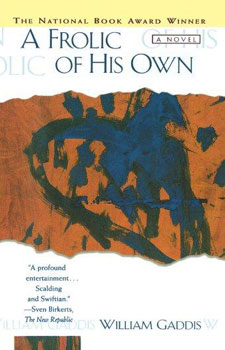ISBN: 9780684800523
Date read: 28/04/2021
How strongly I recommend it: 7/10
Support your local bookshop by going to Bookshop.org to buy your copy (instead of THAT online shopping website…)
‘Justice? –You get justice in the next world, in this world you have the law.’[1]
So reads the opening line to A Frolic of His Own, William Gaddis’s fourth novel, which won the 1994 National Book Award (Gaddis’s second time, the first being when he won it in ’76 with JR). I stuck the opening line up here for a few reasons.
The first reason is that, as with JR‘s opening line, ‘—Money…? in a voice that rustled.’, it perfectly sets up the sole focus of the novel; in A Frolic of His Own it being The Law. Nearly all of the characters in the novel are involved in lawsuits, with each one growing more ridiculous and convoluted to point of being practically incomprehensible, possibly unresolvable.
The novel revolves around Oscar Crease, a history lecturer who is embroiled in a number of lawsuits, the main one regarding his unpublished play, ‘Once at Antietam,’ that he believes has been plagiarised and made into a film, ‘The Blood In The Red, White And Blue,’ by Hollywood director Constantine Keister.
Oscar attempts to navigate this legal labyrinth all while recovering from injuries sustained when attempting to hotwire his own car after it failed to start, which has subsequently started up and run him over. He is therefore involved in another lawsuit in which he is suing the car manufacturer, as well as the owner of the car. Himself. Oh, and the model of the car?:
-It’s garaged at your, at the place of the accident I can’t find the, what kind of car is it.
-Sosumi.
-I’m being quite serious Mister Crease.
-So am I! It’s a Japanese car, a Sosumi.[2]
The second reason is that, for anyone unfamiliar with Gaddis’s style, this also showcases just that; we are not told who is talking, and the reader is required to figure it out by what the characters say to each other and how they say it. We don’t even get a basic physical description of any of the characters. For example, we only realise the character of Oscar’s lawyer, Mr Basie, is black after Oscar makes a faux pas while recounting how he was mugged and Basie responds to it:
-You get the police?
-No, I just said I got on the next bus. I couldn’t have identified them if I had, probably why he turned away without thanking me so I wouldn’t get a good look at him.
-All look the same though, don’t we.[3]
If all of this has already put you off, then I don’t blame you. It is worth noting, however, that the novel’s difficulty does actually function to serve the plot and the book’s overall sense of humour. In these dialogue scenes, we are supposed to feel lost. When we don’t feel lost, it is because Gaddis wants us to laugh at the characters because they are lost.
There are sections of the novel where the typeface actually changes, and we are now reading legal documents and court transcripts that are even more convoluted, but the principle is the same, with events under discussion in court being recounted in painstaking detail before being related to past legal cases that we never see. It’s all supposed to be incomprehensible to the layman:
-Legal language, I mean who can understand legal language but another lawyer, it’s like a, I mean it’s all a conspiracy, think about it Harry. It’s a conspiracy.
-Of course it is, I don’t have to think about it. Every profession is a conspiracy against the public, every profession protects itself with a language of its own, look at the psychiatrist they’re sending me to, ever try to read a balance sheet?[4]
The third and final reason I wanted to put the opening line in here, as well as ending up putting in some other funny bits from the book, is that they are all good examples of, and litmus tests for, the novel’s humour, which usually falls into the two extreme categories; either simple puns, all the way up to being heavily reference based, mostly literary (see ‘here’ for the sort of references I mean) or just downright obscure.
If you are on board, great, you’ll probably enjoy this book, and returning Gaddis fans may even spot the references to characters and events from Gaddis’s previous novel Carpenter’s Gothic (1985), which similarly dealt with characters involved in a lawsuit (In A Frolic of His Own, we get to see what happened to them beyond the scope of the previous novel, which I think is kind of neat).
If, however, you are unresponsive to these examples (and I freely admit that I was to some of the book, and I like Gaddis), I’d maybe start with his earlier book JR. This one’s definitely only for the Gaddisheads, and God knows there don’t seem to be many of us around, but it is a scathing, often hilarious, roller-coaster romp through the American legal system, where courtroom battles are dragged out to infinity and legal documents are as numerous, and about as valuable, as confetti.
[1] William Gaddis, A Frolic of His Own, (New York: Scribner, 1995) p.1
[2] Ibid, p.29
[3] Ibid, p.95
[4] Ibid, p.251
